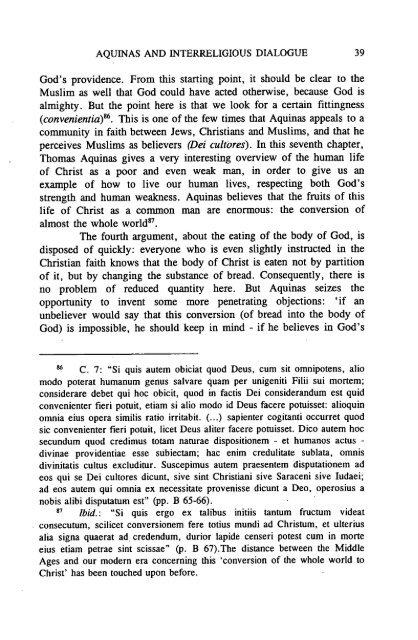Jaarboek Thomas Instituut 1997 - Thomas Instituut te Utrecht
Jaarboek Thomas Instituut 1997 - Thomas Instituut te Utrecht
Jaarboek Thomas Instituut 1997 - Thomas Instituut te Utrecht
Create successful ePaper yourself
Turn your PDF publications into a flip-book with our unique Google optimized e-Paper software.
AQUINAS AND INTERRELIGIOUS DIALOGUE 39<br />
God's providence. From this starting point, it should be clear to the<br />
Muslim as well that God could have ac<strong>te</strong>d otherwise, because God is<br />
almighty. But the point here is that we look for a certain fittingness<br />
(convenientiaf". This is one of the few times that Aquinas appeals to a<br />
community in faith between Jews, Christians and Muslims, and that he<br />
perceives Muslims as believers (Dei cultoresï. In this seventh chap<strong>te</strong>r,<br />
<strong>Thomas</strong> Aquinas gives a very in<strong>te</strong>resting overview of the human life<br />
of Christ as a poor and even weak man, in order to give us an<br />
example of how to live our human lives, respecting both God's<br />
strength and human weakness. Aquinas believes that the fruits of this<br />
life of Christ as a common man are enormous: the conversion of<br />
almost the whole world".<br />
The fourth argument, about the eating of the body of God, is<br />
disposed of quickly: everyone who is even slightly instruc<strong>te</strong>d in the<br />
Christian faith knows that the body of Christ is ea<strong>te</strong>n not by partition<br />
of it, but by changing the substance of bread. Consequently, there is<br />
no problem of reduced quantity here. But Aquinas seizes the<br />
opportunity to invent some more penetrating objections: 'if an<br />
unbeliever would say that this conversion (of bread into the body of<br />
God) is impossible, he should keep in mind - if he believes in God's<br />
86 C. 7: "Si quis au<strong>te</strong>m obiciat quod Deus, cum sit omnipo<strong>te</strong>ns, alio<br />
modo po<strong>te</strong>rat humanum genus salvare quam per unigeniti Filii sui mor<strong>te</strong>m;<br />
considerare debet qui hoc obicit, quod in factis Dei considerandum est quid<br />
convenien<strong>te</strong>r fieri potuit, etiam si alio modo id Deus facere potuisset: alioquin<br />
omnia eius opera similis ratio irritabit. (... ) sapien<strong>te</strong>r cogitanti occurret quod<br />
sic convenien<strong>te</strong>r fieri potuit, Iicet Deus ali<strong>te</strong>r facere potuisset. Dico au<strong>te</strong>m hoc<br />
secundum quod credimus totam naturae dispositionem - et humanos actus -<br />
divinae providentiae esse subiectam; hac enim credulita<strong>te</strong> subIata, omnis<br />
divinitatis cultus excluditur. Suscepimus au<strong>te</strong>m praesen<strong>te</strong>m disputationem ad<br />
eos qui se Dei cultores dicunt, sive sint Christiani sive Saraceni sive Iudaei;<br />
ad eos au<strong>te</strong>m qui omnia ex necessita<strong>te</strong> provenisse dicunt a Deo, operosius a<br />
nobis alibi disputatum est" (pp. B 65-66).<br />
87 Ibid.: "Si quis ergo ex talibus initiis tantum fructum videat<br />
consecutum, scilicet conversionem fere totius mundi ad Christum, et ul<strong>te</strong>rius<br />
alia signa quaerat ad. credendum, durior lapide censeri po<strong>te</strong>st cum in mor<strong>te</strong><br />
eius etiam petrae sint scissae" (p. B 67).The distance between the Middle<br />
Ages and our modern era concerning this 'conversion of the whole world to<br />
Christ' has been touched upon before.








